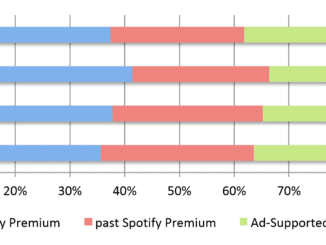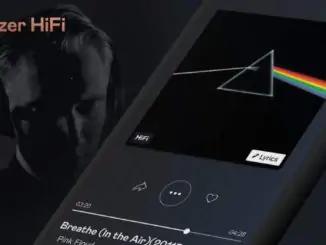
Entertainment was UK’s fastest growing leisure sector in 2020 with retail spending on music, video and games up 18.8% as leisure plunges 30%. The combined music, video and games market grew faster than any other leisure sector in 2020, according to figures revealed by the Entertainment Retailers Association (ERA) in the ERA Yearbook.
Retail spending increased by 18.3% to a record £9.26 Bn while the overall leisure sector – everything from hobbies, sport and eating out to holidays abroad – shrunk 29.1% due to the coronavirus lockdown. The final £9.26 Bn tally for 2020 is £210m larger than preliminary figures first published in January indicated. It marks the eighth successive year of growth for the sector, mostly driven by streaming.
| Entertainment was biggest winner from lockdown | |||||||
| Biggest Winners | Biggest Losers | ||||||
| 1 | Music, video, games | £9.3bn | +18.3% | 1 | Overseas holidays | £21.3bn | -65.8% |
| 2 | Entertainment hardware | £25.7bn | +3.7% | 2 | UK holidays | £8.9bn | -43.8% |
| 3 | Gambling | £14.9bn | +1.3% | 3 | Local entertainment | £6.3bn | -40.8% |
| 4 | House and garden | £18.7bn | +1.2% | 4 | Eating out | £37.9bn | -40.2% |
Source: Leisure Industries Research Centre/ERA Yearbook
Drawing on figures from Sheffield Hallam University’s Leisure Industries Centre, the ERA Yearbook records that while ‘in home’ leisure spending of all types grew by 2.3% in 2020 to £77.7 Bn, ‘away from home’ expenditure including eating out, events and holidays declined 38.6% to £154.1 Bn. The headline 18.3% increase in entertainment spending in 2020 was the highest recorded growth rate the UK market has ever seen. Games remains the biggest single sector, accounting for 48% of aggregate sales, followed by video (35%) and music (17%).
| ERA Entertainment Monitor 2020 Retail spending (£m) |
|||
| 2019 | 2020 | % change | |
| Videogames | £3,764.6 | £4,432.2 | +17.7% |
| Video | £2,610.6 | £3,279.1 | +25.6% |
| Music | £1,453.7 | £1,552.0 | +6.8% |
| Total | £7,828.8 | £9,263.3 | +18.3% |
Source: ERA Yearbook
The combined music, video and games markets have grown 38% since 2016. Key driver remains the growth of digital services. Fastest growing digital sector in 2020 was video, where sales soared by 37.7% to £2.9 Bn, driven mainly by the growth of subscription services such as Netflix, Disney+ and Amazon Prime Video. Less positively, video suffered the biggest decline in physical sales as spending on DVD and Blu-ray fell 25.6% to £372.6m.
| Entertainment becomes more digital | ||||
| Physical | Digital | |||
| 2020 value | % change | 2020 value | % change | |
| Videogames | £645.7 | +7.2% | £3,786.5 | +19.7% |
| Video | £372.6 | -25.6% | £2,906.4 | +37.7% |
| Music | £271.6 | -14.6% | £1,280.4 | +12.8% |
| Total | £1,289.9 | -9.2% | £7,973.3 | +24.4% |
Source: ERA Yearbook
There were some clear positives for physical, however, with sales of video console games up 7.7% to £638.5m, driven by the launches of the Playstation 5 and Xbox Series. Meanwhile sales of vinyl LPs enjoyed their 12th successive year of growth to reach £110.1m, up 13.3%.
Further highlights from the ERA Yearbook
- The most popular device for playing videogames is the smartphone, used by 34.7% of gamers;
- Steam is the most popular destination for downloading games, used by 47.7% of gamers;
- Subscription video-on-demand services like Netflix are now the most popular way to consume paid-for video, chosen by 61.6% of the population and 82.6% of under-25s;
- Subscription services now account for 74% of spending on video, with the number of subscriptions doubling over the past two years;
- After years of sharp declines in sales of album downloads, spending on CD albums is three times that on downloads;
- Sales of vinyl singles (up 21.8%) are now growing faster than those of vinyl LPs (+13.3%).




